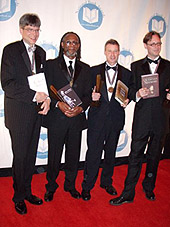National Book Awards Go to Powers, Egan, Mackey, and Anderson
 Left to right: Richard Powers, Nathaniel Mackey, Timothy Egan, M.T. Anderson. |
Richard Powers (The Echo Maker, FSG), Timothy Egan (The Worst Hard Time: The Untold Story of Those Who Survived the Great American Dust Bowl, Houghton Mifflin); Nathaniel Mackey (Splay Anthem, New Directions), and M.T. Anderson (The Astonishing Life of Octavian Nothing, Traitor to the Nation, Vol. 1: The Pox Party, Candlewick) were the recipients of the 57th National Book Awards at a ceremony last night in New York City. Also honored for their contributions to American Letters were poet Adrienne Rich and the co-founders of The New York Review of Books, Robert Silvers and the late Barbara Epstein.
Three of the four winning titles are also Book Sense Picks: Fiction winner The Echo Maker is a January 2007 Pick; Nonfiction winner The Worst Hard Time is a January 2006 Pick; and Young People's Literature winner The Astonishing Life of Octavian Nothing, Traitor to the Nation, Vol. 1 is on the Winter 2006/2007 Book Sense Children's list.

Following the ceremony, Powers told BTW that independent booksellers made possible the plurality and diversity of books. "It's the independents that offer the alternative to that one book that the market wants everybody to read," he said.



Each winner received a $10,000 prize and a bronze statue.
Presenting the second Literarian Award for Outstanding Service to the American Literary Community, New Yorker editor David Remnick said of Silvers and Epstein, "No editors have proved themselves as deeply intelligent ... nurturing, hardworking, and humane."
Silvers thanked the foundation for the "unexpected and generous honor," noting that editors do not typically win such recognition. He also expressed sadness that Epstein could not be there with him.
Poet and memoirist Mark Doty introduced Adrienne Rich and presented her with the Medal for Distinguished Contribution to American Letters. Doty said that her writings -- collections of essays and nearly 20 books of poetry -- had inspired readers to rise to her work and "awaken changed."
Rich told the quiet audience of hundreds of publishers, authors, and readers, "Poetry has the capacity in its own ways and by its own means to remind us what's forbidden to see -- a forgotten future." --Karen Schechner

